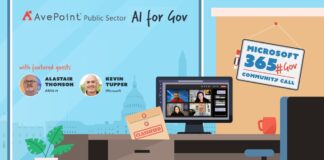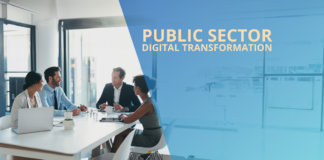You may have seen our exciting news last month about being named 2017 Microsoft Partner of the Year Award for Public Sector: Microsoft CityNext – a global initiative to help local governments connect with constituents and increase efficiency. It’s an honor to win and a testament to our dedication to serving public sector customers who in turn serve the country.
The reality is that citizens are pushing the technology envelope as governments race to catch up. Citizens are early adopters. They’re clamoring for information through the tech they use every day. They’re used to having their voices heard and getting information immediately. As such, they’re pushing public sector agencies to reimagine citizen service and engagement.
Governments don’t want to be laggards. And they don’t have to be. They can build better ways to engage with citizens without making major investments in training, capital, and time. In the process, they can streamline their operations. They can build a better citizen connectivity platform. And that’s what Microsoft CityNext is really all about.
But not all customers realize how CityNext can take their organizations to the next level. With better collaboration and helpful BI, CityNext is helping local government and infrastructure become more responsive and proactive. Let’s take a deeper look at how CityNext brings Microsoft solutions together in a way that is tailor-fit for local infrastructure.
Collaboration with Citizens with Office 365
One of the key features of CityNext is collaboration with a city’s residents. Smartphones are nearly ubiquitous according to Pew Research in January of this year. They found that more than 3 out of 4 Americans own a smartphone (which is an increase of more than 40 percent since 2011). That presents a huge opportunity for local government organizations, though few really know how to take advantage of the trend.
The CityNext initiative provides a framework for organizations to:
- Better understand the services and tools their citizens need via mobile-based technology solutions
- Expand the audience reach by making it easier for citizens to engage and alert organizations to issues
- Rapidly respond to citizens and improve the speed and delivery of services across the city
Microsoft already offers a lot of great tools for mobile productivity, from Power Apps for Forms to mobile access to SharePoint sites. What CityNext does is bring all of these together with the help of the Microsoft partner ecosystem, to ensure the information flow between citizens and the organization is seamless.
There’s been a shift in Microsoft’s approach to collaboration that is more centered on the needs of end users, and CityNext seems to take the same approach by putting citizens first.
Better Internal Connectedness with Azure, Office 365 and Dynamics
Collaboration has traditionally been about people connecting better with each other. Nowadays, collaboration means people working better with data, too. The cloud is making it easier for city employees to work more cohesively, and leverage community data to ensure citizens are getting the best service possible.
Azure Government is a great way for local government agencies to get started on the cloud, offering a highly secure solution for storing and handling government data. It is already compliant with the highest government regulations (in fact, it has a Level 5 DoD certification), and the US-based datacenters are constantly monitored. That way, your data is secure against cyber-thieves, but also readily available for your organization to access.
We can’t mention cloud strategy without talking about Office 365, which is quickly becoming a staple in smart cloud strategies for the public sector. Office 365 makes it easy for employees to discover and collaborate on documents (with features like sharing, co-authoring and offline access), especially for workers who need to be productive from the road.
Combine that with the powerful BI and engagement services from Dynamics and CRM, and city organizations have a winning combination that can not only increase productivity, but also cut costs, keep data more secure and improve relations with citizens.
Making it Seamless with Automation
CityNext makes cloud transformation for local governments much easier, and partners take it even further. The partner ecosystem is able to plan, support and manage migrations in less time, which cuts costs and reduces headaches for people who rely on the IT infrastructure to do their jobs. Partners can also help automate a lot of the systems and solutions involved with CityNext to make processes smoother and even more collaborative within and between departments.
We highlighted an example of how a smart city can use CityNext and our award-winning AvePoint Citizen Services to address maintenance concerns and even stay one step ahead of problems, by automating CityNext processes. Check it out below.
We are planning a webinar in the coming months to speak specifically about migrating to cloud solutions in the public sector. Stay tuned for more information on that session, where we can address more of your government cloud questions. In the meantime, I explain a little more about how AvePoint can support Microsoft cloud migration for the public sector.





